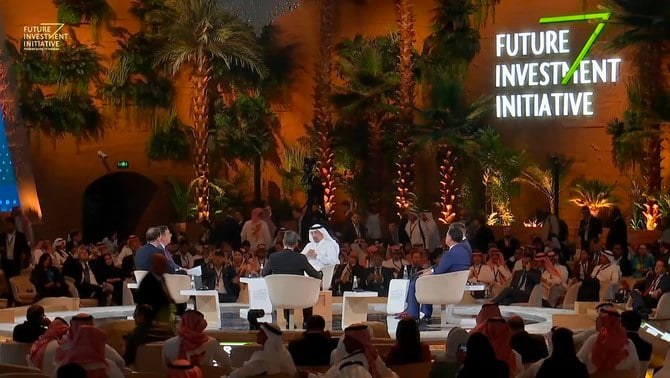RIYADH: For the sixth year in a row, Riyadh is hosting the Future Investment Initiative, a forum that brings together participants from more than 50 nations to discuss, listen and connect, through a diverse series of sessions on business, tech and shared challenges facing humanity.
About 6,000 of the world’s business leaders, policymakers, investors, entrepreneurs and tech experts have gathered in the Saudi capital to explore a fundamental question: What will the new global order look like?
The theme of this year’s forum, “Investing in humanity: Enabling a new global order,” invited participants to delve into topics as diverse as education, artificial intelligence and robotics, health, and sustainability.
During Tuesday’s sessions, delegates explored issues such as supply-chain disruption, the growing demand for travel since the lifting of pandemic restrictions, e-commerce, cybercrime, and the widespread problem of rising inflation.
Much of the discussions revolved around ways in which investors, businesses and governments can work together to recover and restructure vital sectors of the global economy in the aftermath of the COVID-19 pandemic.
“We are in a mess; in fact, we’re in a great mess and, depending on who you’re listening to, a mess that’s going to get even greater,” CNN’s Richard Quest, who hosted several of the day’s sessions, told delegates.
The event, hosted by the King Abdulaziz International Conference Center, gives Saudi and international businesses with a presence in the Kingdom a chance to showcase what they believe the future will look like, from extravagant travel experiences provided by the newly renamed Red Sea Global to major projects developed by the Public Investment Fund.
Panels on the main stage dominated the conversation on Tuesday, while an open stage area and the palm grove pavilions hosted sessions on a wide range of topics, including equality, data, aerospace, and NEOM — the new smart-city development taking shape along the Kingdom’s Red Sea coast.
Just as the global economy was starting to emerge from the shock of the pandemic, the war in Ukraine and resulting Western sanctions on Russia set back the recovery, causing disruption to supply chains and food security, and rising fuel prices. The results include rising inflation worldwide that is running at a 40-year high, growing levels of poverty, and the threat of a looming global recession.
In a panel titled “The new global order: View from the stateroom,” Khalid Al-Falih, the Saudi minister of investment, said the accelerated frequency of disruptions to political and security transitions, the energy transition, and trade and supply-chain transition is worrying.
“Putting it in the context of globalization and deglobalization that is happening, and continues to happen, each of these (trends) is subjecting countries, companies and individuals to an insurance premium,” said Al-Falih.
“These three underpinned the fourth transition, which is the economic transition; higher inflation, higher interest rates, the higher premiums that we’re paying for all this is setting the stage for prolonged slower growth and slower income.”
In keeping with the topic of transitions, participants in a panel titled “Leading the meta-industrial revolution,” pointed out that the world is moving away from manufacturing and services, and instead embracing data, knowledge and information. This transformation from the physical to the virtual was accelerated by the pandemic, they said.
“Today, there is a centralized world that we’re all already operating in that brings physical and augmented virtual reality together,” said Hani Kablawi, chairman of investments company BNY Mellon International.
“We’ve been having ‘virtual’ meetings for a very long time with augmented reality. We’ve been taking tours at innovation centers or cyber centers in virtual reality settings and we’ve been training and developing our staff for a while in that same way.
“But all those things so far have been on what we call ‘centralized platforms’ and the revolution, if you want to call it that, or going to 3.0, might take us into an environment that is a little bit different because it might bring decentralization to the underlying platform and might bring different worlds and platforms together.”
This transition has left institutions vulnerable, however. The number of cyberattacks on leading industries worldwide has grown since the start of the pandemic, mainly in the area of data exfiltration and leakage (55 percent), phishing emails (51 percent), and account takeover (44 percent).
In a panel titled “Safeguarding against future cybercrime,” experts pointed out that no sector is safe from cyberattacks and the threat is often constant, putting massive pressure on systems.
Experts agreed that much more needs to be done to prepare governments and firms to withstand the constant threat of data breaches and malware in an increasingly interconnected world. Panelists were also in agreement that further technological advances are needed to close digital loopholes that could put companies and government entities at risk, and investment in cybersecurity is needed to combat cybercriminals.
Education and new ways of working also featured prominently on the agenda. For many of the speakers participating in a panel called “Clash of priorities,” education was widely viewed as a key element in their move to start their own companies or become partners in global firms.
In many workplaces, different generations can have vastly different work styles. However, through enhanced communication, management of workplace expectations, tailor-made multi-generational office initiatives, proper guidelines, and diversification of expectations, panelists said the challenges can be overcome.
“Six years ago, people over 50 years old and people under 30 years old, 60 percent were watching the same thing. Two years ago, it was 7 percent,” Guillaume Lacroix, the CEO of Brut, a media company that specializes in short-form video content, told the panel.
“For the generation gap in information, you need education to try to make the two come together. Education on some basic tools to understand the world for Gen Z, and education on leaders and how to talk to them, as there is absolutely no communication.”















